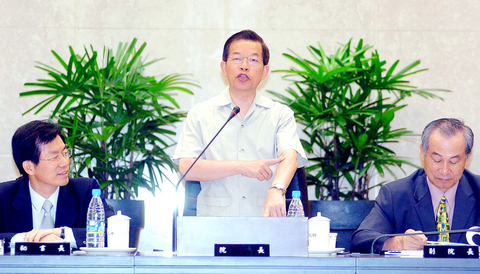Premier Frank Hsieh (
"To raise utility prices is not that simple. It requires expert evaluation and the legislature's final approval, so it will definitely take a while," the premier said.
"There is no need to panic but I would sincerely urge the public to help conserve more electric power and water anyway," he said.

PHOTO: LIAO CHEN-HUI, TAIPEI TIMES
The premier made his remarks during the opening speech of the weekly Cabinet meeting yesterday morning.
He said that there are three concerns for the government to consider when it came to raising utility prices.
"First of all, the market mechanism is the most important thing; secondly, [we must adhere to] the government's economic policies; finally [we must adhere to] the government's energy policies," the premier said.
In the meantime, Hsieh also said that the proposal to raise utility prices was meant to encourage the public to conserve as many resources as possible.
"If the prices remain unchanged, people will not learn the lesson that our resources will not always be available. In addition, if people do not consume that much, we will not have to come up with other solutions, such as establishing more nuclear power plants, to solve the problem of power shortages," Hsieh said.
As for gas prices, the premier said that the government would not take action at the moment. He would not say whether gas prices would go up in the near future.
Yesterday was also Hsieh's first time to not wear his jacket and tie to work. Instead, he put on grey "island wear" to meet the press and his fellow Cabinet members.
"Island wear" shirts are popular and are regarded as formal wear for men in Southeast Asia and many South Pacific countries.
"Wearing `island wear' is cool and convenient, and will help conserve power since we do not have to rely on air conditioning so much," Hsieh said.
The idea of men wearing less formal attire to work originated in Japan, which has introduced a casual dress code so that office air conditioners can be turned down to save electricity and help the country reduce greenhouse gas emissions.
Under the measure, air-conditioners must be set at 28?C. Men will not have to wear a suit and tie between June 1 and Sept. 30, so that more air-conditioners can be turned down, or off.
The idea was first mentioned here to Cabinet Spokesman Cho Jung-tai (
Cho acknowledged the idea, and said that he would report it to Hsieh.
"I like this. It is comfortable. But the blemish is that the shirt does not have enough pockets for me, so I cannot carry as many items as I did in my suit and tie," Hsieh said.

CHAOS: Iranians took to the streets playing celebratory music after reports of Khamenei’s death on Saturday, while mourners also gathered in Tehran yesterday Iranian Supreme Leader Ayatollah Ali Khamenei was killed in a major attack on Iran launched by Israel and the US, throwing the future of the Islamic republic into doubt and raising the risk of regional instability. Iranian state television and the state-run IRNA news agency announced the 86-year-old’s death early yesterday. US President Donald Trump said it gave Iranians their “greatest chance” to “take back” their country. The announcements came after a joint US and Israeli aerial bombardment that targeted Iranian military and governmental sites. Trump said the “heavy and pinpoint bombing” would continue through the week or as long

TRUST: The KMT said it respected the US’ timing and considerations, and hoped it would continue to honor its commitments to helping Taiwan bolster its defenses and deterrence US President Donald Trump is delaying a multibillion-dollar arms sale to Taiwan to ensure his visit to Beijing is successful, a New York Times report said. The weapons sales package has stalled in the US Department of State, the report said, citing US officials it did not identify. The White House has told agencies not to push forward ahead of Trump’s meeting with Chinese President Xi Jinping (習近平), it said. The two last month held a phone call to discuss trade and geopolitical flashpoints ahead of the summit. Xi raised the Taiwan issue and urged the US to handle arms sales to

State-run CPC Corp, Taiwan (CPC, 台灣中油) yesterday said that it had confirmed on Saturday night with its liquefied natural gas (LNG) and crude oil suppliers that shipments are proceeding as scheduled and that domestic supplies remain unaffected. The CPC yesterday announced the gasoline and diesel prices will rise by NT$0.2 and NT$0.4 per liter, respectively, starting Monday, citing Middle East tensions and blizzards in the eastern United States. CPC also iterated it has been reducing the proportion of crude oil imports from the Middle East and diversifying its supply sources in the past few years in response to geopolitical risks, expanding

Pro-democracy media tycoon Jimmy Lai’s (黎智英) fraud conviction and prison sentence were yesterday overturned by a Hong Kong court, in a surprise legal decision that comes soon after Lai was jailed for 20 years on a separate national security charge. Judges Jeremy Poon (潘兆初), Anthea Pang (彭寶琴) and Derek Pang (彭偉昌) said in the judgement that they allowed the appeal from Lai, and another defendant in the case, to proceed, as a lower court judge had “erred.” “The Court of Appeal gave them leave to appeal against their conviction, allowed their appeals, quashed the convictions and set aside the sentences,” the judges